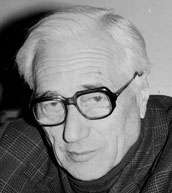Boris Levin
| Boris Levin | |
|---|---|
 | |
| Born |
Boris Yakovlevich Levin 22 December 1906 Odessa, Russian Empire |
| Died |
24 August 1993 (aged 86) Moscow, Russian Federation |
| Fields | Mathematics |
| Institutions | B Verkin Institute for Low Temperature Physics and Engineering |
Boris Yakovlevich Levin (Russian: Борис Яковлевич Левин, 22 December 1906 – 24 August 1993) was a Soviet mathematician who made significant contributions to function theory.
Biography
Boris Yakovlevich Levin was born 22 December 1906 in Odessa.[1]
In 1932 he graduated from the University of North Caucasus. From 1935 to 1949 he is Professor and Head of the Department of Mathematics of the Odessa Institute of Marine Engineers.
In 1949, invited by N. I. Akhiezer, he moved to Kharkov, and since that time he worked at the Kharkov State University.[2]
In 1969 he organized the Department of function theory in the Institute for Low Temperature Physics and Engineering of Ukrainian Academy of Sciences, which he led until 1986.
Levin died in Moscow on 24 August 1993, at the age of 86.[3]
Scientific interests
Research of B.Ya. Levin is concerned to the theory of entire functions, functional analysis, harmonic analysis, the theory of almost periodic and quasi-analytic functions. He obtained the fundamental results concerning non-harmonic Fourier series and operators preserving inequalities in various classes of entire functions of exponential type. Together with N.I. Akhiezer, he discovered a relation between extremal problems of the theory of entire functions and conformal transformations onto canonical domains. He introduced a class of operators of transformation, which is the basis for solving the inverse scattering problem.
The theory of entire functions of completely regular growth brought fame to Boris Yakovlevich Levin. He created this theory in the mid of 1930s concurrently with Albert Pfluger. This theory describes a very wide class of entire functions, containing the majority of entire functions encountered in applications. For the functions of this class, the relation between their behaviour at infinity and distribution of zeros can be described by the asymptotic formulas.
In 1956, Boris Yakovlevich had published his monograph "Distribution of zeros of entire functions", which was translated into German and English, and which is, to present days, the handbook for many professionals working in different areas of mathematics.
In 1997 a Boris Levin memorial conference "Entire Functions in Modern Analysis" was held at the Tel-Aviv University.[4] In 2006 an international conference dedicated to the centennial of Boris Levin's birthday took place in Kharkov.[5]
Bibliography
- B.Ya.Levin. Lectures on entire functions. English revised edition. Amer. Math. Soc., Providence, RI, 1996.
- Distribution о f zeros of entire functions, 1964, Amer. Math. Soc, Providence, R. I ., 493 pp. Revised edition, 1980, Amer. Math. Soc, Providence, R.I., 523 pp.
- Nullstellenverteilung ganzer Funktionen, 1962, Math. Lehrbucher und Monographien, Bd. XIV, Akademie-Verlag, Berlin, 512.
- Распределение корней целых функций , 1956, Гостехиздат , М., 632 стр.
References
- ↑ In commemoration of Boris Yakovlevich Levin (1906–1993), Journal of Mathematical Physics, Analysis, Geometry, 1 (1994), no. 2, pp. 358–359
- ↑ Boris Yakovlevich Levin (by Editorial Board, on centenary of his birth), Functional Analysis and Its Applications, 40 (2006), no. 4, pp. 247–248
- ↑ V. S. Azarin, A. A. Gol'dberg, E. A. Gorin, V. A. Marchenko, I. V. Ostrovskii, A. V. Pogorelov, L. I. Ronkin, M. L. Sodin and V. A. Tkachenko, Boris Yakovlevich Levin (obituary), Russian Mathematica Surveys, 49 (1994), no 1, pp. 219–221
- ↑ Entire Functions in Modern Analysis: Boris Levin Memorial Conference, Proceedings of the conference held at Tel-Aviv University, Tel-Aviv, December 14–19, 1997. Edited by Yuri Lyubich, Vitali Milman, Iossif Ostrovskii, Mikhail Sodin, Vadim Tkachenko and Lawrence Zalcman. Israel Mathematical Conference Proceedings, 15. Bar-Ilan University, Gelbart Research Institute for Mathematical Sciences, Ramat Gan; Bar-Ilan University, Emmy Noether Research Institute of Mathematics, Ramat Gan, 2001.
- ↑ International Conference on the centennial of the birthday of B. Ya. Levin, Journal of Mathematical Physics, Analysis, Geometry, 3 (2007), no 1, p. 128
- J. J. O'Connor and E. F. Robertson, Boris Yakovlevich Levin, MacTutor History of Mathematics archive
- Biography of B.Ya.Levin at B.Verkin ILTPE of the National Academy of Sciences of Ukraine.
- N. V. Efimov, M. G. Krein, I. V. Ostrovskii, Boris Jakovlevich Levin: On the occasion of his sixtieth birthday. (in Russian), Uspekhi Matematicheskikh Nauk 23 (1968), no. 5 (143), pp. 187–191
- Boris Yakovlevich Levin (obituary).
External links
- Bibliography of B.Ya.Levin.
- Scientific school of B.Ya.Levin.
- Boris Levin at the Mathematics Genealogy Project
- B.Ya.Levin at TURNBULL.